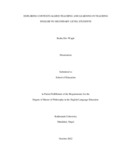
Please use this identifier to cite or link to this item:
https://hdl.handle.net/20.500.14301/118| Title: | EXPLORING CONTEXTUALIZED TEACHING AND LEARNING IN TEACHING ENGLISH TO SECONDARY-LEVEL STUDENTS |
| Authors: | Wagle, Bashu Dev |
| Citation: | Wagle,B.D.()2022).Exploring contextualized teaching and learning in teaching English to secondary-level students. |
| Issue Date: | Dec-2022 |
| Publisher: | Kathmandu University School of Education |
| School: | SOED |
| Department: | DOLE |
| Level: | M.Phil. |
| Abstract: | This study explores the issues of contextualization in teaching and learning English in the context of Nepal. I, particularly, focus on contextualized teaching and learning, like teaching English through non-English subjects, teaching different subjects by using English as a medium of instruction, teaching with many examples from local context and the like. Through contextualized teaching and learning, we can help students be motivated by letting them know the real benefit of learning any content through any language. I agree with Baker, Hope, Karandjeff, Bond and Predmore, who argue that learners can learn far better through the contextualized teaching and learning (CTL) process because teachers instruct students by making them participate actively. CTL involves practical activities lessening the theoretical approach and increasing applied aspect of life. So, I believe teachers can more easily concretize teaching and learning through CTL. I am sure CTL enhances learners’ efficiency as well. iii By ‘exploring’, the first word of the research title, I mean, inquiring into or discussing any subject in detail. I enquired about a subject matter to understand the issues of CTL through an ethnographic observation of the research site and participants. I aimed to investigate how teachers go through contextualized teaching and learning. Thus, this dissertation explores how teachers implement CTL while teaching English to secondary-level learners in Nepal. For this, I used a qualitative approach so far as possible. And I observed teachers and their students at a secondary school in the Lalitpur district and collected data for this research. I sat together with students on the same bench in their classroom while their teachers were teaching them. I felt the pain and pleasure my participants felt in their classrooms. I experienced the experience of my participants, I talked to them, I laughed with them and I walked with them hand in hand. Then only, I could collect the data. I analyzed the data by going through the extended case method which is a deductive method to analyze the data. To the end of the research, I found that teachers could motivate students to learn and get them much more interested in teaching and learning English through contextualized teaching and learning at the secondary level in Nepali context. At last, this research might become a milestone in English language teaching as it has added a new dimension to ELT pedagogy at the secondary level. It initiates a discussion about how pedagogical orthodoxies must be challenged and how we, as teachers, can better teach English to students by contextualizing the content. |
| URI: | http://101.251.6.110:8080/handle/20.500.14301/118 |
| Appears in Collections: | Dissertation |
Files in This Item:
| File | Description | Size | Format | |
|---|---|---|---|---|
| WCC_Final Bashu Wagle_MPhil Research WCC.pdf | 2.07 MB | Adobe PDF |  View/Open |
Items in DSpace are protected by copyright, with all rights reserved, unless otherwise indicated.